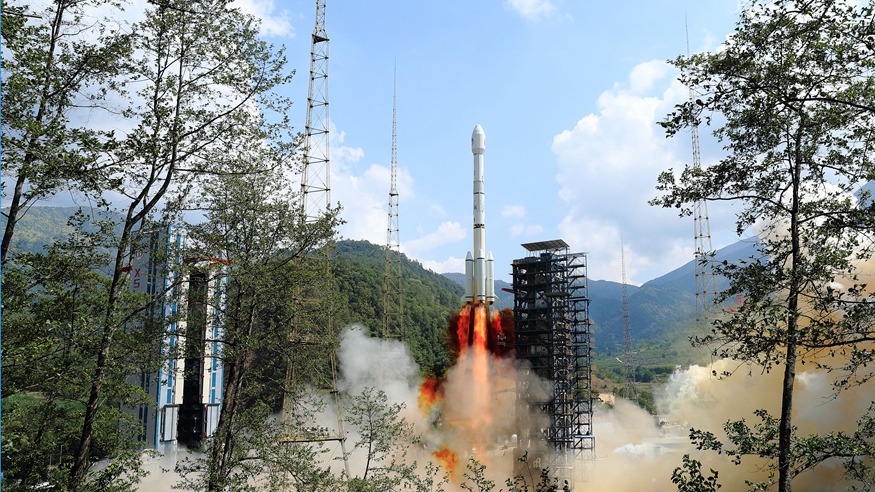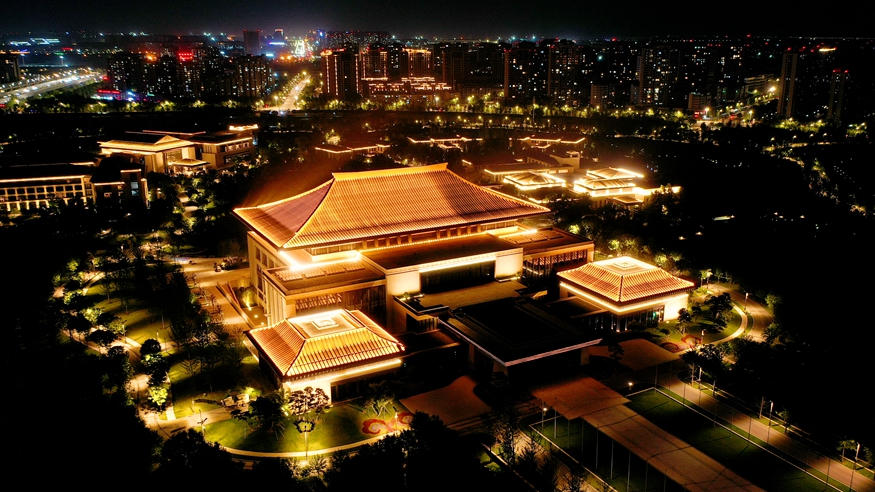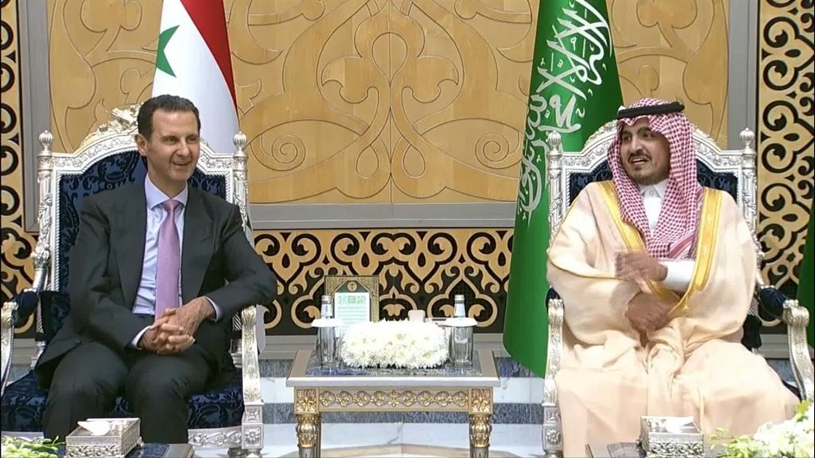* The world is shifting toward multi-polar powers and it can "no longer fall victim to the United States and its desires."
by Xinhua writer Shuai Anning
JEDDAH, Saudi Arabia, May 20 (Xinhua) -- After being ostracized for 12 years, Syrian President Bashar al-Assad made a comeback to the Arab League (AL) Summit held in the Saudi city of Jeddah on Friday amid a growing Arab reconciliation trend at a time when the U.S. influence wanes in the Middle East.
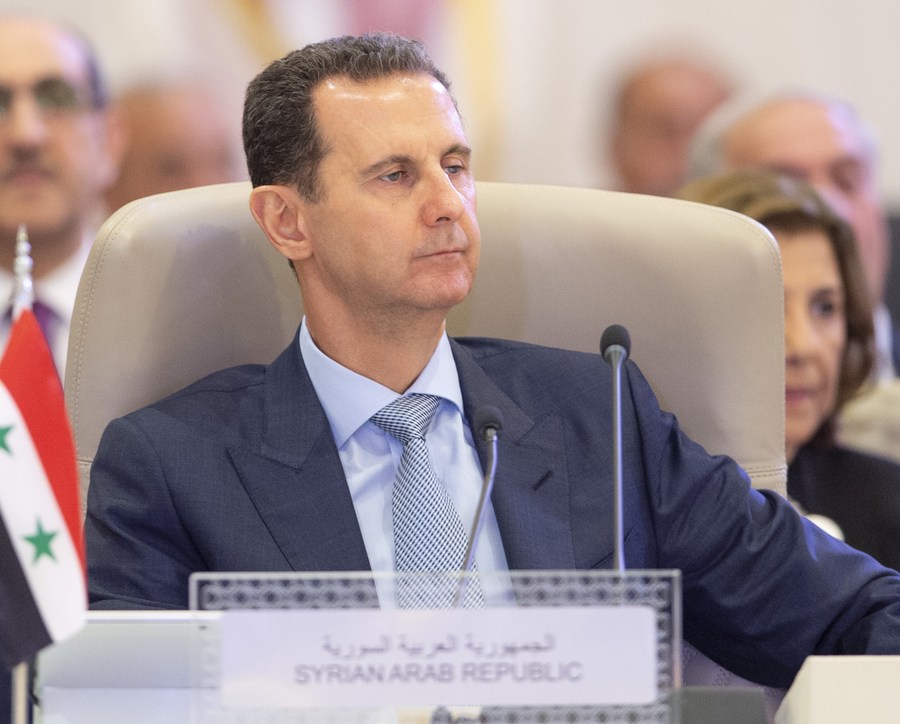
Syrian President Bashar al-Assad attends the 32nd Arab League Summit in Jeddah, Saudi Arabia, May 19, 2023. (Saudi Press Agency/Handout via Xinhua)
Receiving a warm welcome from Saudi Crown Prince and Prime Minister Mohammed bin Salman Al Saud, who greeted him with hugs and kisses, Assad hailed the summit as a "historic opportunity" to address crises across the region.
"I hope that it marks the beginning of a new phase of Arab action for solidarity among us, for peace in our region, development and prosperity instead of war and destruction," Assad told summit attendees.
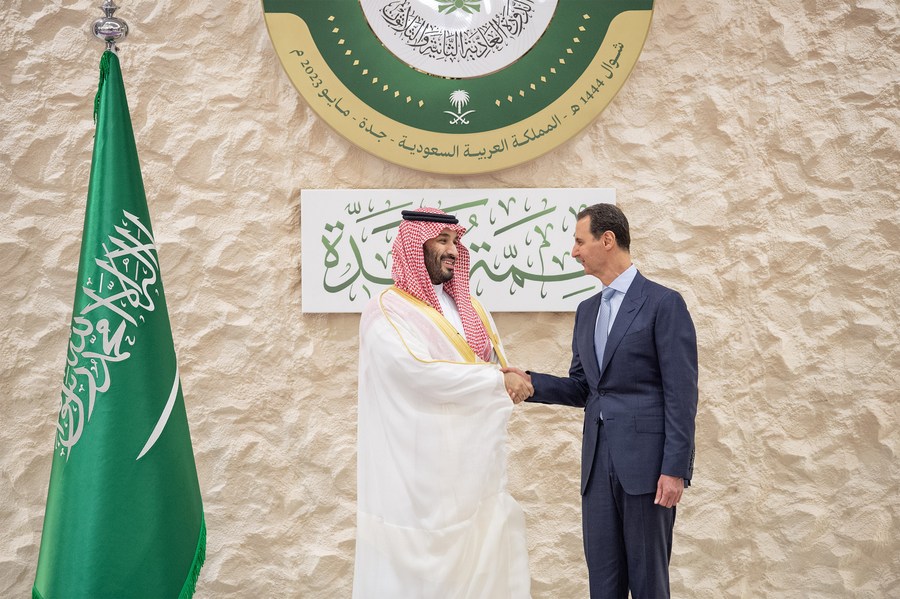
Saudi Crown Prince and Prime Minister Mohammed bin Salman Al Saud (L) shakes hands with Syrian President Bashar al-Assad at a welcome ceremony prior to the 32nd Arab League Summit in Jeddah, Saudi Arabia, May 19, 2023. (Saudi Press Agency/Handout via Xinhua)
SYRIA'S REINTEGRATION
The return of Syria, which was suspended from the Arab League in 2011 when the Syrian civil war broke out, signaled the culmination of the recent rapprochements among Arab states.
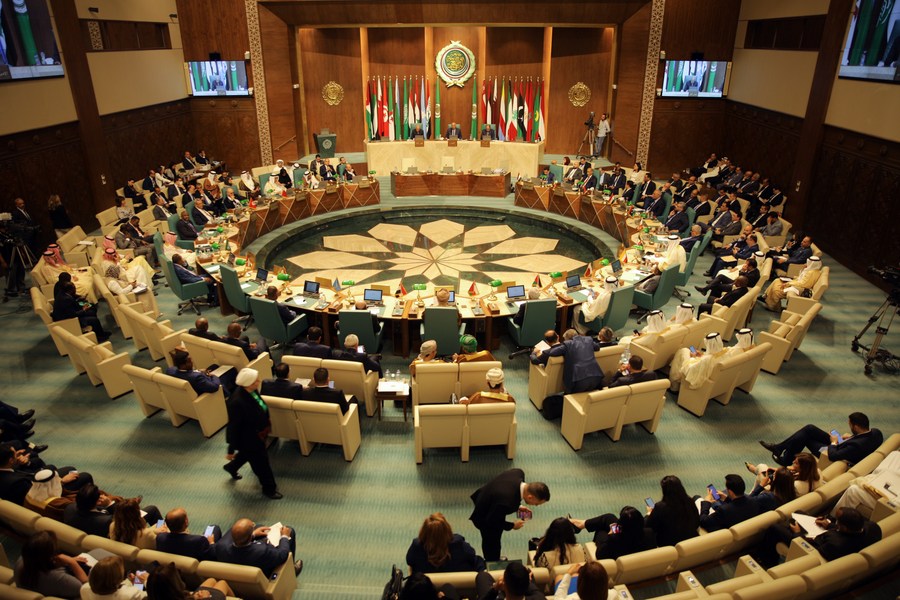
This photo taken on May 7, 2023 shows a scene of an Arab League (AL) extraordinary meeting in Cairo, Egypt. Arab foreign ministers decided in the meeting to restore Syria's AL membership after 12 years of suspension. (Xinhua/Ahmed Gomaa)
In the past two years, a wave of reconciliation swept across the Middle East, as Arab countries sought more independence in foreign policy and mended fences among themselves to regain Arab solidarity to deal with common challenges amid the gradual U.S. retreat from the region. The disgraceful U.S. troops pullout from Afghanistan in 2021 further eroded many Arab countries' trust in Washington's security guarantees.
As the Syrian government gradually regained much control of its territory with Assad holding on to power despite the 12-year war, Arab countries need Syria's cooperation in dealing with the return of Syrian refugees and curbing the country's drug trade that troubles neighboring countries.
In 2018, the United Arab Emirates reestablished diplomatic ties with Syria, followed by the reopening of borders between Syria and Jordan in 2021. Earlier this month, the Arab League reinstated Syria's membership to the pan-Arab body, a milestone in Syria's regional rehabilitation.
The recent Chinese-brokered resumption of ties between Iran and Saudi Arabia is also believed to have accelerated Syria's return to the Arab fold.
Saudi Arabia and Iran, two long-time rivals which support different sides in the Syrian crisis, achieved historic reconciliation under China's mediation in March, paving the way for Syria's reconciliation with Arab states.
On May 8, the Chinese Foreign Ministry spokesperson Wang Wenbin congratulated Syria on its return to the Arab League, noting that China welcomes and supports Arab solidarity and will continue to work relentlessly to that end.
The return of Syria to the Arab fold symbolizes the independence and solidarity among Arab countries and raises hope for more peace initiatives in the Middle East, analysts said.
ARAB UNITY
The regaining of Arab unity was widely applauded by Arab leaders, who hoped that it would lead to Arab solutions to the regional hotspot issues and challenges.
After the conclusion of the Jeddah summit, AL Secretary-General Ahmed Aboul-Gheit highlighted the summit's success in achieving its goal, expressing hope that the summit would be a beginning for the Arab countries to grasp their fate in their own hands.
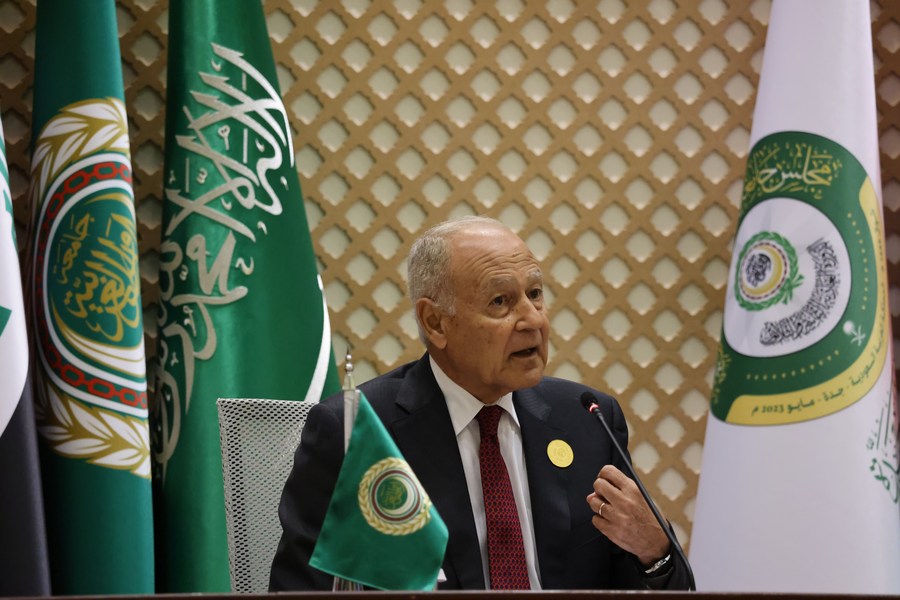
Arab League Secretary-General Ahmed Aboul-Gheit attends a press conference after the 32nd Arab League Summit in Jeddah, Saudi Arabia, May 19, 2023. (Saudi Press Agency/Handout via Xinhua)
The page had been turned on "painful years of struggle," said the Saudi crown prince at the opening remarks of the summit, hoping that Syria's "return to the Arab League leads to the end of its crisis."
Saudi Arabia would "not allow our region to turn into a field of conflicts," he added.
In the Jeddah Declaration issued after the summit, AL member states stressed Arab unity to solve the region's multiple crises.
The Declaration welcomed Syria's readmission to the AL, vowing to intensify pan-Arab efforts to help Syria tackle its crisis.
As for the Palestinian-Israeli conflict, the Declaration affirmed the centrality of the Palestinian cause to Arab nations and upheld Palestine's right to establish an independent and sovereign Palestinian state on Palestinian territory on the 1967 borders, with East Jerusalem as its capital.
The Declaration urged for the de-escalation of tensions in Sudan, called for the election of a new Lebanese president and the required reforms to lift Lebanon out of its crisis, and supported initiatives to promote security and stability in Yemen.
The declaration rejected foreign interference in the domestic affairs of Arab countries and stressed the importance of presenting a unified Arab front on regional and international issues.
U.S. DISILLUSIONED
The United States, which has long been benefiting from the chaos and conflicts in the Middle East, was disillusioned as Syria was re-embraced by the Arab world.
Washington has been imposing sanctions on Syria and pushing for its isolation in the Arab world to punish Damascus for close relations with Iran and Russia, both U.S. rivals.
Soon after the Arab League decided to re-instate Syria as a member, the United States said it would continue to oppose normalizing relations with Assad.
"Our position is clear: We are not going to be in the business of normalizing relations with Assad and with that regime," U.S. Secretary of State Antony Blinken told reporters in Washington on May 9.
The U.S. still maintains harsh economic sanctions on Syria and attempts to continue the policy of isolation against the war-torn country.
Osama Danura, a Damascus-based Syrian political expert, told Xinhua that despite the external interference, Arab countries will choose to prioritize their national and regional interests.
"All of their attempts to isolate and sever relations between neighboring countries (in the Mideast) could only last for a few years. The geography and shared interests of the countries will finally win over the U.S. desires," Danura said.
Ahmad al-Ashqar, a Syrian journalist and political expert, said that it is apparent that American foreign policies have always relied on fomenting chaos and instability to serve its own interests, instead of helping to find peaceful solutions to crises around the world.
"Today, it has become clear that no conflict happens without a driving force behind it," he told Xinhua in an interview.
Washington still harbors the delusion that the U.S. as the only superpower can impose its will on any others, but "the world today is shifting toward multi-polar powers and it can "no longer fall victim to the United States and its desires," Danura said. (Video reporter: Wang Jian; video editors: Zhou Saang, Wei Yin, Li Qin, Lin Lin)■


